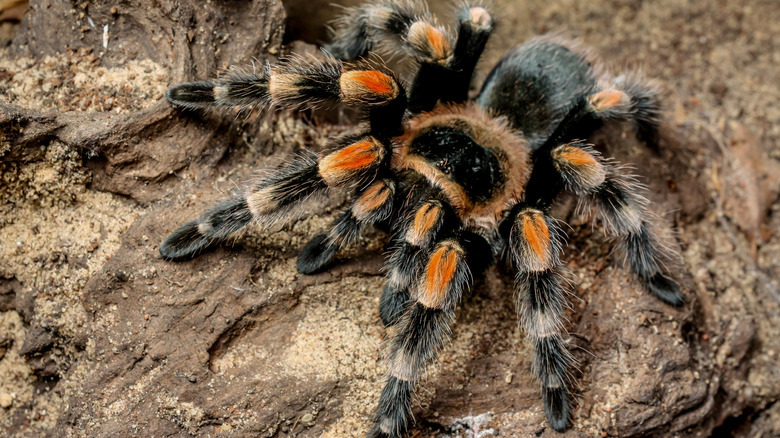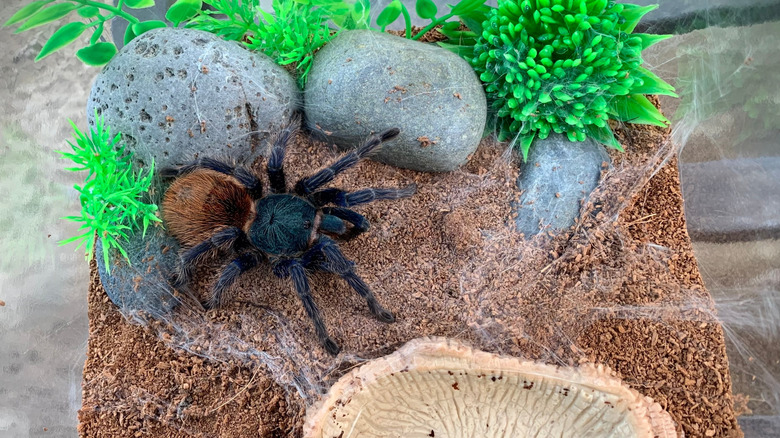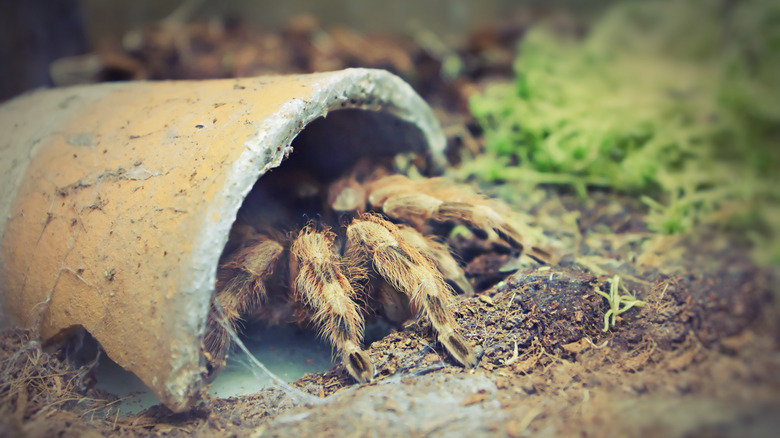One Of The World's Most Feared Spiders Can Live Up To 30 Years As A Pet
Spiders aren't always the first animals potential pet owners consider. They're not quite as cuddly as dogs or cats, they have twice as many legs, and the fear of them is one of the most well-known and widely-experienced phobias. However, if you don't suffer from arachnophobia or you simply want to bring a fascinating creature into your household, think about adding a tarantula to your family.
These big, fuzzy spiders are extremely low-maintenance pets. If they're cared for properly, they can live for up to 20 or 30 years, depending on the breed, which puts them toward the very top of the list of the average life spans of popular pets. Interestingly, female tarantulas are often much bigger and live much longer than their male counterparts. Lifespans also vary from breed to breed, with some, like the female pink toe tarantula, living closer to 10 years. On the other hand, the Mexican red-knee lives between 20 and 30 years old for females, and 10 years old for males.
There are nearly 1,000 species of tarantulas, and some breeds make better pets than others, especially for beginner tarantula owners. Breeds like Mexican red-knee, Chilean rose, and Honduran curly hair tarantulas are known to be slow-moving and fairly calm, making them easier to handle for the inexperienced tarantula owner. However, it's important to note that tarantulas shouldn't be handled unless necessary, as they can bite if they feel threatened.
Benefits of owning a tarantula
Compared to many other pets, the list of care requirements for tarantulas is fairly short. This makes them ideal for the busy pet owner who doesn't care to own an animal that needs lots of attention and affection. They're also quiet, so if you live in an apartment or noise is a concern, it doesn't get much more silent than a tarantula when it comes to pets.
The cost of owning a tarantula is also relatively low compared to lots of other pets, and they don't take up a ton of space, either. If you have a pet that likes to cheat the no furniture rule by jumping on couches, you may be happy to know tarantulas won't. In fact, they thrive in fairly contained spaces. Other added benefits? No fur, drool, or accidents on the carpet to contend with.
Lastly, everyone is familiar with what a dog does or how a cat moves, but you don't see tarantulas every day (unless you own one, of course). Just watching them exist is interesting, and for the right pet parent who will appreciate them for exactly who they are, a tarantula could be a wonderful addition to their life.
How to help your tarantula enjoy a long life
Tarantulas are solitary animals who do best as the only one in their habitat, which should be a 20-gallon aquarium or larger. They should be kept in a quiet area that's not overly bright. Their tank will need a substrate; a layer of soft, organic material they can spin a web over — it's how tarantulas adapt to their environment. Good options include coconut coir, peat moss, or even regular topsoil. You can also add a few rocks for climbing. They do require a hiding space, which could be as simple as a small flower pot on its side. In general, tarantula habitats should be kept humid and warm, between 70 and 85 degrees Fahrenheit.
You only have to feed your tarantula a few times a week and refill their shallow water dish daily. They need to eat live food, mainly insects like crickets, mealworms, and dubia roaches. Dr. Krista Keller of the University of Illinois College of Veterinary Medicine warns, "Some people may be tempted to drop several crickets at one time to feed their spider throughout the week. However, this practice may lead to injuries." It's best to instead clean up what they don't eat after about 10 minutes.
Importantly, your tarantula shouldn't be handled often. If they feel threatened, they can bite, and tarantula bites are venomous. The reaction from most species' bites is usually comparable to a bee sting, but it varies from individual to individual. They can also release their spiky hairs as a defense mechanism, which can burrow into your skin and irritate it.


